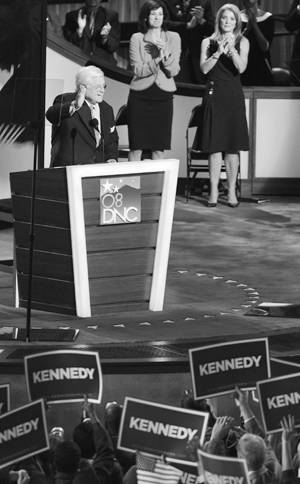FREDERICK: Nostalgia at Democratic Convention

Sen. Edward M. Kennedy, D-Mass., waves as his wife Victoria, left rear, and his niece Caroline, right rear, applaud his appearance at the Democratic National Convention in Denver, Monday, Aug. 25, 2008. (AP Photo/Ted S. Warren)
August 26, 2008
For a party that seems absorbed in the politics of “change”, this week’s Democratic National Convention has seemed, well, slightly nostalgic. Sure there was Michelle Obama’s Monday night keynote, but that was hardly the headline for the evening. That belonged to the ailing Ted Kennedy, and you can hardly get any more old-guard Democrat than the Kennedys.
In fact, watching the Senator from Massachusetts speak on Monday evening, especially with the sound muted, was almost enough to make one wonder just how far the Democratic Party has really come. There he was: the senator, son of Joseph Kennedy, the quintessential gentile Boston Democrat, a product of Hyannisport, refined in the crucible of the public eye that is the life of a Kennedy.
There was the crowd: the party faithful, mostly, practically climbing over themselves to get a better look at this last remnant of fallen Camelot, waving signs with “Kennedy” on them in large white letters.
For a moment, to the casual observer, aside from the massive plasma screens behind the podium, it could have been the Los Angeles Convention of 1960, or the Ambassador Hotel. It was, perhaps, the last roar of an old lion.
All that nostalgia, all the video clips of misty-eyed Democrats listening to the ailing Kennedy patriarch, and the chants of “Teddy! Teddy!” made for great theater, but what message does parading old-guard Democrats like Kennedy, Biden, Reid and Albright say about the Democratic Party on the eve of the coronation of Obama? How much of a “change” is a speaking lineup of two Kennedys, two Clintons, a Daschle, a Schumer, a Kerry and a Gore?
Actions speaking louder than words: one conclusion to be drawn from the list of personalities speaking might be that the Democrats aren’t nearly as “change” oriented as they would let on. Indeed, Kennedy’s speech — it was more of a pep rally, really — had little more than a single solid policy reference in it, to health care, an issue Kennedy has been heavily involved with for decades.
Reading the texts of the speeches, the Democrats seem less than inclined toward change. Sure, Mrs. Obama’s speech spoke of it — three times in 2,200 words (“hope” made eight appearances) — but behind all of the hazy rhetoric about hope and change, the same old Democratic Party still lies. The “hope and change” message has only served as a surrogate for discussion of real issues, and — as we’ve seen in a few weeks of television ads — has provided plenty of fodder for the McCain ad machine.
Clearly, what Obama and the Democrats are lacking is the perception of a clear position. The McCain ad puts quite well, if ironically, “Don’t hope for change. Vote for it.” More plainly: people want answers, and hoping isn’t an answer.
That’s not to say that the Obama campaign doesn’t have its obvious high points. It’s refreshing, for instance, to finally have a fluent speaker running for the White House.
Then there’s the Clinton factor. The sight of Hillary pacing the platform after her introduction, and the depth and breadth of applause accorded her was almost enough to make the casual onlooker wonder just whose convention this really was. That was followed, naturally, by the obligatory “bury the hatchet” speech. We’ll see Thursday night just how well that worked.
Which leads to yet another point: How hard is it to decide whether or not to have a roll call vote to determine the nomination? Roll calls aren’t unusual, in fact the nominee has been chosen by acclamation only four times in the party’s history, and it has only become a common occurrence in the last decade, with both Clinton and Gore being nominated via this method. Kerry was nominated in 2004 via the regular voting method.
All-in-all, the Democrats’ convention has been quite entertaining, if only for its seeming contradictions. It’s been a long road since the Iowa caucuses in January, but we’re in the home stretch. Just two more months of election ads, random phone calls and voter registration drives remaining!
— Ryan Frederick is a senior in management from Orient.






